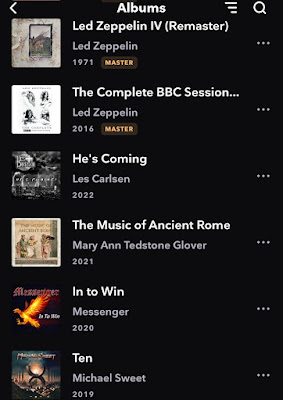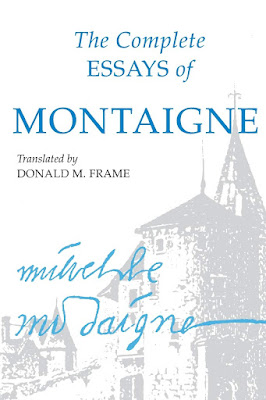Sometimes a writer needs to step back and let someone else's words do the talking. What follows are selections from Montaigne's essay "Of the art of discussion," written between 1585 and 1588. They are taken from the translation by Donald M. Frame, and I will offer no further comment beyond that my recent reading and pondering of this essay made me think of two of my current students, Dominic and Addison, who have already tasted the fruits of philosophical thought and discovered that they are sweet. May they and others take from Montaigne a model of how to discuss the breadth and the depth of human thought.
De l'Art de Conferer
The most fruitful and natural exercise of our mind, in my opinion, is discussion.
The study of books is a languishing and feeble activity that gives no heat, whereas discussion teaches and exercises us at the same time. If I discuss with a strong mind and a stiff jouster, he presses on my flanks, prods me right and left; his ideas launch mine. Rivalry, glory, competition, push me and lift me above myself. And unison is an altogether boring quality in discussion.
As our mind is strengthened by communication with vigorous and orderly minds, so it is impossible to say how much it loses and degenerates by our continual association and frequentation with mean and sickly minds. There is no contagion that spreads like that one.
No propositions astonish me, no belief offends me, whatever contrast it offers to my own. There is no fancy so frivolous and so extravagant that it does not seem to me quite suitable to the production of the human mind.
So contradictions of opinions neither offend me nor affect me; they merely arouse and exercise me. We flee from correction; we should face it and go to meet it, especially when ti comes in the form of discussion, not ex cathedra. At every opposition we do not consider whether it is just, but, right or wrong, how we can get rid of it. Instead of stretching out our arms to it, we stretch out our claws.
I could stand to be rudely jarred by my friends: "You're a fool, you're dreaming." I like to see people speak up bravely among gallant men, and to see the words go where the thought goes. We should strengthen and toughen our ears against this tenderness toward the ceremonious sound of words. I like a strong, manly fellowship and familiarity, a friendship that delights in the sharpness and vigor of its intercourse....
When someone opposes me, he arouses my attention, not my anger. I go to meet a man who contradicts me, who instructs me. The cause of truth should be the common cause for both.
I give a warm welcome to truth in whatever hand I find it, and cheerfully surrender to it and extend my conquered arms, from as far off as I see it approach. However, it is certainly hard to induce men of my time to do this. They do not have the courage to correct because they have not the courage to suffer being corrected.
[T]here is nothing which makes us so sensitive to contradictions as the idea of our superiority and disdain for our adversary.
It is an insipid and harmful pleasure to have to do with people who admire us and give way to us.
In fine, I receive and acknowledge any sort of blows that are straightforward, however weak they be, but I am only too intolerant of those that are out of order. For me any answer is only too good if it is to the point. But when the argument is confused and disorderly, I give up the substance.... It is impossible to discuss things in good faith with a fool.
We learn to argue only in order to contradict; and with each man contradicting and being contradicted, it turns out the fruit of the argument is to ruin and annihilate the truth. Thus Plato, in his Republic, prohibits this exercise to inept and ill-born minds.
I love and honor learning as much as those who have it; and in its true use it is man's most noble and powerful acquisition. But in those (and their number is infinite) who base their fundamental capacity and worth on it, who appeal from their understanding to their memory, hiding under the shadows of others [Seneca], and can do nothing except by the book, I hate it, if I dare say so, a little more than stupidity.
It is my opinion that in Plato and Xenophon Socrates argues more for the sake of the arguers than for the sake of the argument, and to instruct Euthydemus and Protagoras rather in their own impertinence than in the impertinence of their art. He takes hold of the first subject that comes along like a man who has a more useful aim than to illuminate it: to wit, to illuminate the minds that he undertakes to manage and exercise.
For we are born to quest after the truth; to possess it belongs to a greater power. It is not, as Democritus said, hidden in the bottom of abysses, but rather elevated to an infinite height in the divine knowledge. The world is but a school of inquiry. The question is not who will hit the ring, but who will make the best runs at it.
Any man may speak truly; but to speak with order, wisely, and competently, of that few men are capable. Thus it is not the falsity that comes from ignorance that offends me, but the ineptitude. I have broken off many dealings that would have been useful to me because of the irrelevant bickering of those with whom I was dealing.
[I]t is always a tyrannical ill humor to be unable to endure a way of thinking different from your own; and then in truth there is no greater, more constant, or more uncouth absurdity, than to become worked up and stung by the absurdities of the world.
How many stupid things I say and reply every day, in my own judgment; and so assuredly how many more in the judgment of others! After all, why can we encounter someone with a crooked and malformed body without being moved, when we cannot bear encountering an ill-ordered mind without getting angry? Not only the reproaches that we make to one another, but also our reasons and arguments in controversial matters can ordinarily be turned against ourselves; and we run ourselves through with our own weapons.
I do not mean that no man should criticize another unless he is clean himself.... But I mean that our judgment, laying upon another the blame which is then in question, should not spare us from judging ourselves.
Nor does it seem to me an appropriate reply to someone who warns me of my fault, to say it is also in him. What of it? The warning is still true and useful.
[W]e see so many inept souls among the learned, and more than of the other kind. They would have made good husbandmen, good tradesmen, good artisans; their natural vigor was cut to that proportion. Learning is a thing of great weight; they collapse under it. Their mind has neither enough vigor or enough skill to spread out and distribute that noble and powerful matter, to make use of it and derive help from it. It can do nothing except in a strong nature, and these are very rare. And the weak ones, says Socrates, corrupt the dignity of philosophy in handling it. It appears both useless and harmful when it is badly encased.
Stupidity and senselessness are not curable by a bit of admonition. And we may properly say of this sort of repair work what Cyrus replied to the man who urged him to harangue his army on the point of a battle: that men do not become courageous and warlike on the spot by a good harangue any more than someone suddenly becomes a good musician by listening to a good song. These are apprenticeships that have to be served before hand by long and constant education.
We owe this care to our families, this assiduity in correction and instruction.... But as for things that are said in company or among others, however false or absurd I may judge them to be, I never cut across by either word or sign.
Moreover, nothing vexes me so much in stupidity as the fact that it is better pleased with itself than areason can reasonably be. It is unfortuante that wisdom forbids you to be satisfied with yourself and trust yourself, and always sends you away discontented and diffident, whereas opinionativeness and heedlessness fill their hosts with rejoicing and assurance. And besides, this arrogance of language and gaiety of countenance usually give them the victory in the eyes of the audience, which is generally weak and incapable of judging and discerning clearly where the real advantages lie. Obstinacy and heat of opinion is the surest proof of stupidity. Is there anything so certain, resolute, disdainful, contemplative, grave, and serious as an ass?





































